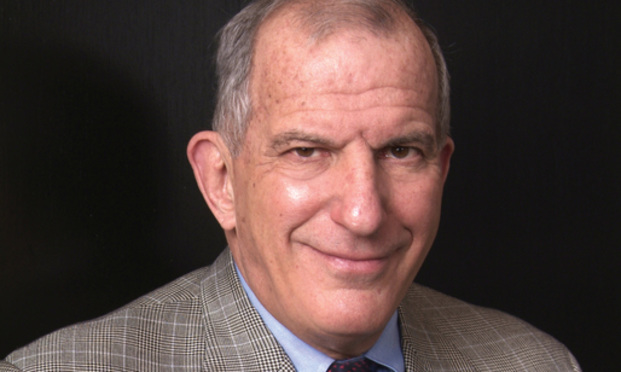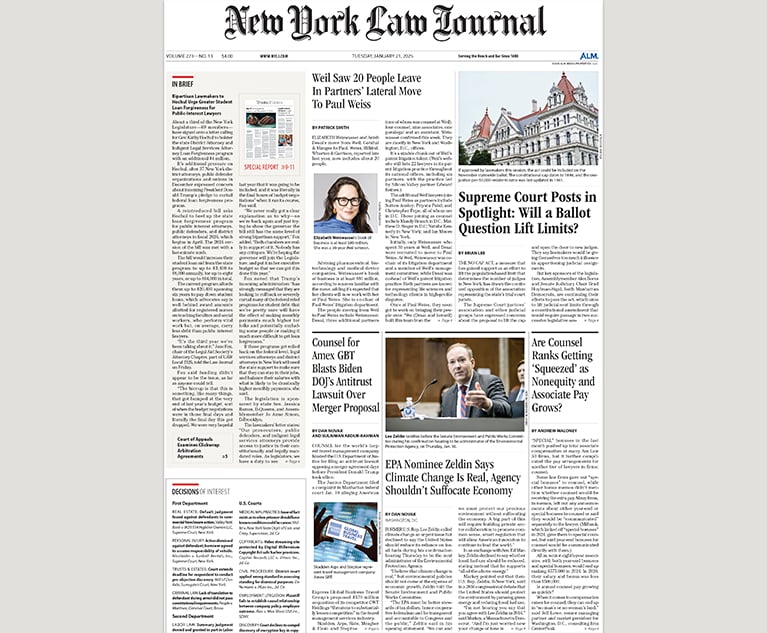Steve Susman to Litigation Funding Industry: Bring It On
Steve Susman was in New York on Wednesday, giving the keynote speech at the litigation finance industry's second annual LF Dealmakers Forum.
September 18, 2019 at 05:31 PM
4 minute read
The original version of this story was published on The American Lawyer
 Photo: Tom Callins
Photo: Tom Callins
Steve Susman thinks his law firm, Susman Godfrey, qualifies as one of the first commercial litigation funders in the U.S.
When he launched the firm in 1980, he didn't view it as a finance operation. But the model was similar: put the firm's own capital towards claims on which other law firms weren't willing to take risks.
That's likely part of why he wound up in New York on Wednesday, giving the keynote speech at the litigation finance industry's second annual LF Dealmakers Forum. Susman offered some suggestions for how litigation funders can improve their strategies. But first, he took issue with one of the fundamental premises of the burgeoning industry, questioning if the wider benefit of third-party finance is indeed, as backers say, to let injured parties have the law firm of their choice, even if they don't have the resources to pay them.
"I say it was to provide large, hourly and typically defense-side law firms the ability to compete with Susman Godfrey," he said."Here's the rub: third-party funding is something every trial lawyer, including me, your biggest competitor, should welcome if the results are the filing of better cases and the more efficient handling of those cases that are filed."
Susman's firm still takes on a considerable number of cases that it finances itself. But the underwriting process is robust. Every attorney gets a vote at a weekly Wednesday meeting, and the firm won't advance expenses unless two-thirds of them endorse a matter.
That degree of care is one of the reasons he's enthusiastic about third-party finance: It's more smart minds weighing the merits of any given claim.
"It can't hurt to have a similar exercise in parallel. But you should not rely on the law firm. You add nothing of value if you do that," he said, adding that funders who actually ask and receive firms' evaluation materials open the door to "enormous" privilege waiver issues.
Susman also advised that third-party funders adopt the same "eat what you kill" philosophy that's been a part of his firm's model from the start.
"You have better results and get more honest answers if the evaluators you have bear the risk too," he said.
Financing arrangements that are linked to attorneys' hourly rates are also trouble, Susman argued, pointing to an arrangement he'd recently learned of where a law firm was earning half its hourly rate to take on an outside-funded case.
"Lawyers who are paid by the half hour, or quarter hour, or any metric that's based on hours spent, have no incentive to be efficient," he said.
Some lawyers, he added, are simply not prepared to take a lean approach to litigating cases, handling a deposition on his own, cutting short discovery and eschewing a final revision of a brief.
"You should not expect a lawyer to change the way he does things, even if in a one-off case it's in the lawyer's interest to be efficient," he said.
Instead, it's necessary to find lawyers who are capable of handling work either on a pure contingency basis, or on a fixed-fee basis, ideally where the firm is fielding 50% of the initial budget, he said.
But, in a continuing theme of his remarks, it's a certain time of firm that he thinks is best at pricing and budgeting. Hint: it's not the big ones.
Susman also acknowledged the biggest story of the last few months in the litigation finance industry: short-seller Muddy Waters attack on Burford Capital. He said that funders should welcome regulation of how they keep their books, lest the matter becomes the "hot coffee case" of the litigation finance industry.
"Embrace transparency and make agreements that are understandable and fair," he said.
Read More
Susman Godfrey Focused on Innovation, Efficiency Before They Were 'Buzzwords'
When Burford Slowed the Litigation Funding Bandwagon
This content has been archived. It is available through our partners, LexisNexis® and Bloomberg Law.
To view this content, please continue to their sites.
Not a Lexis Subscriber?
Subscribe Now
Not a Bloomberg Law Subscriber?
Subscribe Now
NOT FOR REPRINT
© 2025 ALM Global, LLC, All Rights Reserved. Request academic re-use from www.copyright.com. All other uses, submit a request to [email protected]. For more information visit Asset & Logo Licensing.
You Might Like
View All
Neighboring States Have Either Passed or Proposed Climate Superfund Laws—Is Pennsylvania Next?
7 minute read
Trending Stories
- 15th Circuit Considers Challenge to Louisiana's Ten Commandments Law
- 2Crocs Accused of Padding Revenue With Channel-Stuffing HEYDUDE Shoes
- 3E-discovery Practitioners Are Racing to Adapt to Social Media’s Evolving Landscape
- 4The Law Firm Disrupted: For Office Policies, Big Law Has Its Ear to the Market, Not to Trump
- 5FTC Finalizes Child Online Privacy Rule Updates, But Ferguson Eyes Further Changes
Who Got The Work
J. Brugh Lower of Gibbons has entered an appearance for industrial equipment supplier Devco Corporation in a pending trademark infringement lawsuit. The suit, accusing the defendant of selling knock-off Graco products, was filed Dec. 18 in New Jersey District Court by Rivkin Radler on behalf of Graco Inc. and Graco Minnesota. The case, assigned to U.S. District Judge Zahid N. Quraishi, is 3:24-cv-11294, Graco Inc. et al v. Devco Corporation.
Who Got The Work
Rebecca Maller-Stein and Kent A. Yalowitz of Arnold & Porter Kaye Scholer have entered their appearances for Hanaco Venture Capital and its executives, Lior Prosor and David Frankel, in a pending securities lawsuit. The action, filed on Dec. 24 in New York Southern District Court by Zell, Aron & Co. on behalf of Goldeneye Advisors, accuses the defendants of negligently and fraudulently managing the plaintiff's $1 million investment. The case, assigned to U.S. District Judge Vernon S. Broderick, is 1:24-cv-09918, Goldeneye Advisors, LLC v. Hanaco Venture Capital, Ltd. et al.
Who Got The Work
Attorneys from A&O Shearman has stepped in as defense counsel for Toronto-Dominion Bank and other defendants in a pending securities class action. The suit, filed Dec. 11 in New York Southern District Court by Bleichmar Fonti & Auld, accuses the defendants of concealing the bank's 'pervasive' deficiencies in regards to its compliance with the Bank Secrecy Act and the quality of its anti-money laundering controls. The case, assigned to U.S. District Judge Arun Subramanian, is 1:24-cv-09445, Gonzalez v. The Toronto-Dominion Bank et al.
Who Got The Work
Crown Castle International, a Pennsylvania company providing shared communications infrastructure, has turned to Luke D. Wolf of Gordon Rees Scully Mansukhani to fend off a pending breach-of-contract lawsuit. The court action, filed Nov. 25 in Michigan Eastern District Court by Hooper Hathaway PC on behalf of The Town Residences LLC, accuses Crown Castle of failing to transfer approximately $30,000 in utility payments from T-Mobile in breach of a roof-top lease and assignment agreement. The case, assigned to U.S. District Judge Susan K. Declercq, is 2:24-cv-13131, The Town Residences LLC v. T-Mobile US, Inc. et al.
Who Got The Work
Wilfred P. Coronato and Daniel M. Schwartz of McCarter & English have stepped in as defense counsel to Electrolux Home Products Inc. in a pending product liability lawsuit. The court action, filed Nov. 26 in New York Eastern District Court by Poulos Lopiccolo PC and Nagel Rice LLP on behalf of David Stern, alleges that the defendant's refrigerators’ drawers and shelving repeatedly break and fall apart within months after purchase. The case, assigned to U.S. District Judge Joan M. Azrack, is 2:24-cv-08204, Stern v. Electrolux Home Products, Inc.
Featured Firms
Law Offices of Gary Martin Hays & Associates, P.C.
(470) 294-1674
Law Offices of Mark E. Salomone
(857) 444-6468
Smith & Hassler
(713) 739-1250








